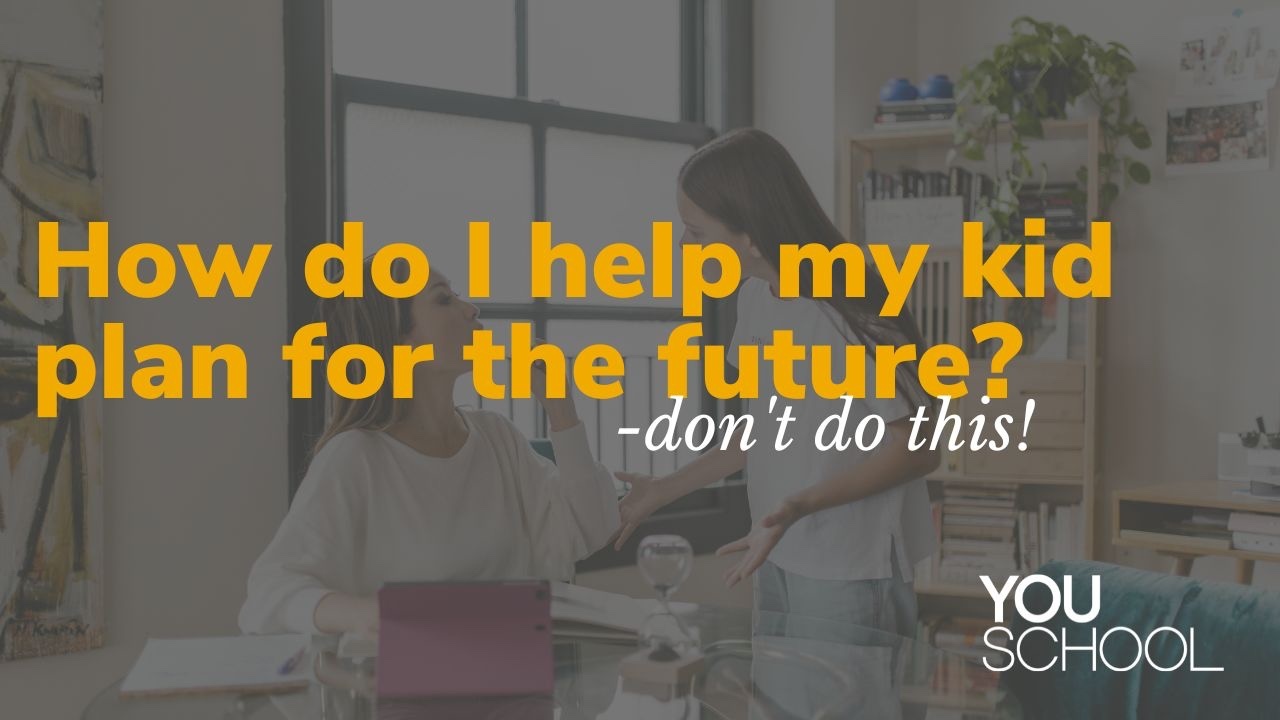How do I help my kid plan for the future? Don't do this!

Nothing matters more to me in life than who my kids become when they grow up. Not my golf game, business success, or lawn health (and those are my big three!). My utmost ambition is who they become, what they do, and where they go.
Unfortunately, since they've become teenagers and started naturally pulling away from me, I have less and less influence on the many decisions that will add up to the trajectory for their lives. It's not that they don't listen to me, they do—but they have it in their heads that their lives are up to them.
Having less influence on those decisions, combined with caring so much and being inherently invested in their future, means I have...anxiety. I'm anxious about their future, how they handle or don't handle responsibility and the complexities of life, and whether or not they will fulfill their potential to build meaningful lives. The very thing that matters most to me isn't up to me, which triggers anxiety.
I'm unsure if they will like me when they become adults and want to come home to visit or call me to check in.
That anxiety in me runs deep and quickly comes to the surface every time we start talking about their class schedule, or college applications, or the SAT vs ACT debate, or when I run into another parent whose kid has a job and is still a teenager.
When I'm anxious about their future, my gut response is to get more intense with them. Ratchet up the volume of my voice, let my eyes get wide, stare at them unblinking, and say things like, "You'd better figure out what classes look good on a college application, sir!"
But hear me loud and clear: transferring your anxiety to them will ensure they have a harder time making clear, wise choices. Why? Easy. When stress and pressure go up, clarity goes down. They feel the threat of your disappointment, and their pre-frontal cortex turns off, and they'll become more likely to take a path of less resistance or, even worse, do something to tick you off even more.
Unsurprisingly, when my anxiety translates into intensity towards them, they either shut down, walk away, or go toe-to-toe with me with equal intensity. What they don't do: walk calmly to the family computer to do a Google search on career earnings potential for each major at the top universities of their choice. Nor do they grab a journal and pen and start reflecting on the big questions in life, like their core values and the type of impact they want to make in the world.
No, they don't need your intensity or your anxiety. Life is complicated enough; the decisions are extraordinary, and they already feel the pressure. Rather, they need you to deal with your anxiety in adult-ish ways, like taking a walk, saying a prayer, calling a friend, scheduling an appointment with your therapist or your priest, lighting a candle, or doing some meditation. Then, when you've dialed down your intensity, they need you to listen to them calmly, mirror what you hear, present alternative viewpoints, and share your own stories of self-discovery. They need you to celebrate the little steps they've taken, especially the ones that took courage and bravery.
They need you to chill out and play the long game.
For further reading, check out this longer article on the 9 Mistakes Parents Make When Talking With Their Kids About Their Future, plus why it doesn't help to tell them to be happy.
